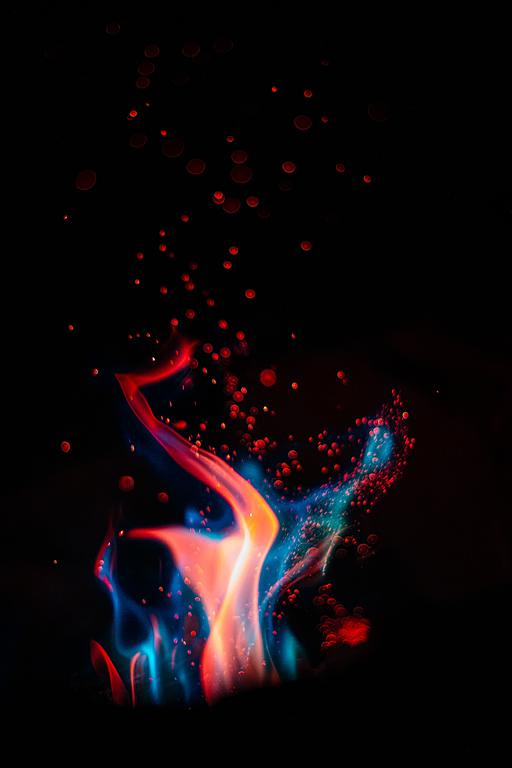[The Four Elements] Fire

Another day, another sunset. The night's darkness slowly embraces the sky. If the weather is on our side, we will notice little sparks appear above our heads. The show is about to start. We see a falling star, and we make a wish. It's like something from above hits the horizon and materializes.
Our ideas are the sparks in our interior mind's sky. They pop here and there, just like stars appear randomly in the night sky. These sparks can start a fire that gives us the enthusiasm to keep going. Or they can be vicious, causing lots of harm and leaving scars. But sometimes, burning all the bad things to the ground can be cathartic. They lingered for too long, and we have to get rid of them. So we have to be careful with our ideas. They can be good or bad. We must learn to discern between the two.
As company owners, we're just like a blacksmith that forges a sword from a bare piece of metal using fire. We shape a product or a service from a concept. We focus on taking an idea, the spark, and using it to light up a fire. We shape the raw material and make it useful. Once it's good enough, we put it out there and hope others will find it helpful too. But playing with fire is hard in the beginning because you don't know how to control or use it. You can put too little fuel, and the combustion won't be enough to sustain it. Putting too much (yep, that can also happen) will get out of control and cause irreversible damage. But with time and practice, you learn that fire can keep you warm, shape materials, and in the end, used meticulously, it can create art. Something that will awe everybody. This is why we mentioned earlier that fire symbolizes the idea behind a product, a service, or a company.
Now, let's consider a situation where you have only one shot. As a newcomer, you prepare your product launch diligently. You put everything together, and once you use your spark to light up the fire, you hope that everybody turns their heads and comes around your fire pit. If not, we need to go back to the drawing board.
Most of the time, your prospects are already around other fire pits. You have to offer them something better for the trade-off to make sense, for them to make the switch. First products might look sloppy. And that's alright, as long as it fixes the problem. It doesn't have to look like a brand-new Mercedes from the beginning.
We always need to aim for good enough. But when do we know we've reached that point? It's not an exact science. We have to develop it. Put restrictions. Set goals that we want to achieve in a time frame that's not too far away for us to procrastinate forever and not too close, so we're always under deadline pressure. In the end, we analyze, and if we're satisfied with the initial version, we can launch it. If not, we allocate one more block for refinements.
Everything needs to work in harmony. All the elements we discussed in this series, Earth, Water, Air, and Fire, need to be taken into account and mixed harmoniously. It's hard to get it right in the first place unless we have a ton of luck and get the right people's attention. Preparation is key. We like it or not; the first impression still matters to a lot of people.
We can't prolong things forever, though. It's better to create an initial version of your product in a few weeks, throw it out in the wild and learn how to perfect it than waste years of work just to realize it wasn't worth it. That's demoralizing, and your hopes for starting new will become more and more daunting. The earlier you can figure out your idea's interest, the better. Sometimes the product doesn't even have to exist to get people's input. A simple question addressed to the right people will do.
One wasted spark might make our idea perish. We put effort into learning from our mistakes, and we try again. There's no reason to lose our hopes on the first attempt. This is our training field, and we can't spend it entirely in our heads. We will never know if something works or not until we put it out there. We might lack a few skills or a lot. We might think we're not made for this. But thinking is not acting, so unless we try to see what happens with our own eyes, the idea will only remain a spark that will eventually fade in our heads.
Once the fire is lit, we have the time to catch on to new abilities along the way. Once the product is out there, we have something concrete we can learn from and adapt. We can't predict the unknowns and uncertainties through all the scenarios running through our minds. The real world is much more complicated than our minds can comprehend all at once.
Once the fire is lit, we have the time to catch on to new abilities along the way. Once the product is out there, we have something concrete we can learn from and adapt. We can't predict the unknowns and uncertainties through all the scenarios running through our minds. The real world is much more complicated than our minds can comprehend all at once.
The hardest thing is to start. Once you do that, you'll see that the rest will become easier the longer you spend time learning and adapting.
Don't be afraid to light up the spark. Each idea has the potential to become the fire that resonates with more and more people. It can unite us, or it can divide us. It's up to us to point it in the right direction.
